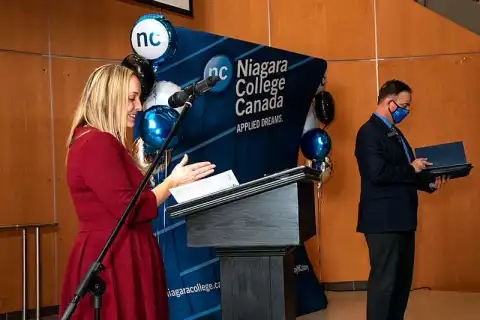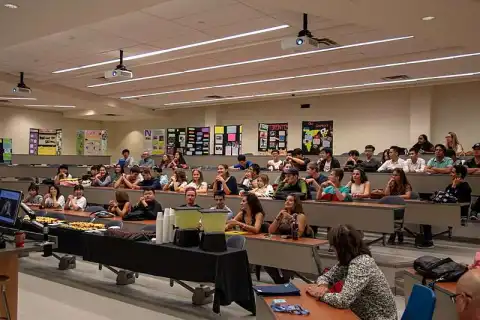Advanced Diploma - Computer Programming and Analysis (Co-op)
- 3 years
- Duration
- 45,803 CAD
- Price
- Rolling admission
- Start
- Rolling admission
- Deadline
- Diploma
- Degree
- Campus
- Format
- Welland / Canada
- Location
Program description
In today's digital environment, do you possess the ability to solve intricate computer puzzles through critical thinking?
You will have a broad range of highly marketable skills as a computer programmer analyst, which you may use to create creative, cutting-edge computer solutions and applications.
Highlights
- Innovative curricula emphasize the creation of software for mobile devices, big data analytics, and interactive multimedia through numerous hours of practical laboratory work.
- Vast practical experience through community-sponsored projects, cooperative work terms, and applied research possibilities.
- Develop the entrepreneurial, teamwork, and communication skills needed in today's IT environment.
- Ability to apply credits toward a degree from a university.
Program structure
Term One
- Communications for Media Studies
- Database Essentials
- Web Authoring Fundamentals
- Mathematics I for Computer Studies
- The Art of Script Programming
- Software Development
Term Two
- Communications for Project Development
- Object Oriented Software Development
- Contemporary Storage Systems Programming
- Client Server Web Solutions
- Mathematics II for Computer Studies
- The IT Professional
Elective Information
- Completion of additional General Education elective 1 course required
Term Three
- Graphically-Driven Project Planning and Design
- Operating System Administration & Networking Fundamentals
- Design Patterns for Enterprise Development
- Multi-Platform Software Development
Elective Information
- Completion of additional General Education elective 1 course required
Term Four
- Community Sponsored Project
- Mobile and Windows Store Development
- Network Security and Large Data Solutions
- Statistics for Computer Programmers
Elective Information
- Completion of additional General Education elective 1 course required
Term Five (Co-Op)
- Co-op Work Term
Term Six
- Advanced Professional Communications
- Developing Mobile Applications
- Big Data Programming and Reporting
- Data Warehouse Design and Implementation
- Advanced Data Structures Concepts
Price
Level One
- Tuition — 7,575 CAD
- Ancillary Fees — 1,965 CAD
- Material Fees — 0 CAD
- Level Total — 9,540 CAD
Level Two
- Tuition — 7,575 CAD
- Ancillary Fees — 1,005 CAD
- Material Fees — 0 CAD
- Level Total — 8,580 CAD
Year One Total: 18,120 CAD
Level Three
- Tuition — 7,575 CAD
- Ancillary Fees — 2,158 CAD
- Material Fees — 0 CAD
- Level Total 9,733 CAD
Level Four
- Tuition — 7,575 CAD
- Ancillary Fees — 1,198 CAD
- Material Fees — 0 CAD
- Level Total — 8,773 CAD
Level Five
- Co-op/work terms have no tuition cost, however the co-op fee(s) in previous terms covers administration of this term.
Year Two Total: 18,506 CAD
Level Six
- Tuition — 7,575 CAD
- Ancillary Fees — 1,601 CAD
- Material Fees — 0 CAD
- Level Total — 9,176 CAD
Year Three Total: 9,176 CAD
Estimated Program Total: 45,803 CAD
Requirements for applicants
Admission Requirements
- Ontario Secondary School Diploma (OSSD), or equivalent including the following required course(s):
- English – any Grade 12 (C) or (U), or equivalent
- Mathematics – any Grade 11 (U) or (M) or Grade 12 (C) or (U), or equivalent
Recommended Courses and/or Skills (these courses and skills may help you succeed academically in this program, but they are not required for admission)
- Computer and Information Science – Grade 11 (M) or Grade 12 (M)
- Information Technology Applications in Business – Grade 11 (O)
- Information Technology in Business – Grade 12 (C)
Language Proficiency Admission Requirements
You will be required to provide proof of one or more of the following:
- Niagara College Mature Student Test for English
- Grade 12 English at the C or U level (Ontario High School Curriculum)
- ACE English (Academic Upgrading)
- International Credential Assessment for studies outside of Canada
If English is your subsequent language, Niagara College (for the purposes of admission to standard non-competitive programs) will also accept these English Language Test Scores
- Cambridge English Exams (B2 First/FCE, C1 Advanced/CAE or C2 Proficiency/CPE) - 169 – No skill under 162
- International English Language Testing System (IELTS) including Indicator Test** 6.0 – No individual band under 5.5.
- Duolingo Language Test - Overall score of 105+, with no individual score under 95
- Internet-based (IBT) Test of English as a Foreign Language (TOEFL) including Special Home Edition Test - Paper-based: 500, Computer based: 173, iBT: 79, Minimum: 20 Writing, 20 Speaking
- Pearson Test of English (PTE) - 46+, with no individual skill under 36
- Canadian Academic English Language Test (CAEL) including CAEL Online Proficiency Test - 60 – No individual band under 50.
- Niagara College’s English for Academic Preparation program (EAP) - Completion of Level 5 English for Academic Preparation (EAP) program with 70% and no individual grade under 50%
About the university

Niagara College, with campuses in Welland and Niagara-on-the-Lake, is conveniently located in the center of the Niagara Region, only minutes away from one of the world's most popular tourist destinations. The college is home to more than 130 cutting-edge academic programs.
All of our campuses are home to state-of-the-art facilities and innovative teaching methods, including small class sizes, cutting-edge research, and real-world application.
These courses put students in an interactive and technologically advanced learning environment. Our grads are well-versed in multiple cultures, quick learners, and risk takers who push the envelope of what's possible in business in Niagara, Canada, and beyond.
Why Niagara College?
- 130+ certificate, diploma, apprenticeship and Bachelor's Degree programs
- 600+ credit, vocational and general interest courses
- We care about you and want you to succeed - employers report high levels of satisfaction with the skills and knowledge possessed by NC graduates.
- Building a sustainable future
- More than seven thousand students per year participate in cooperative education, field placements, internships, learning enterprises, apprenticeships, clinical placements, course-based research, and fieldwork in about one hundred different academic disciplines.





